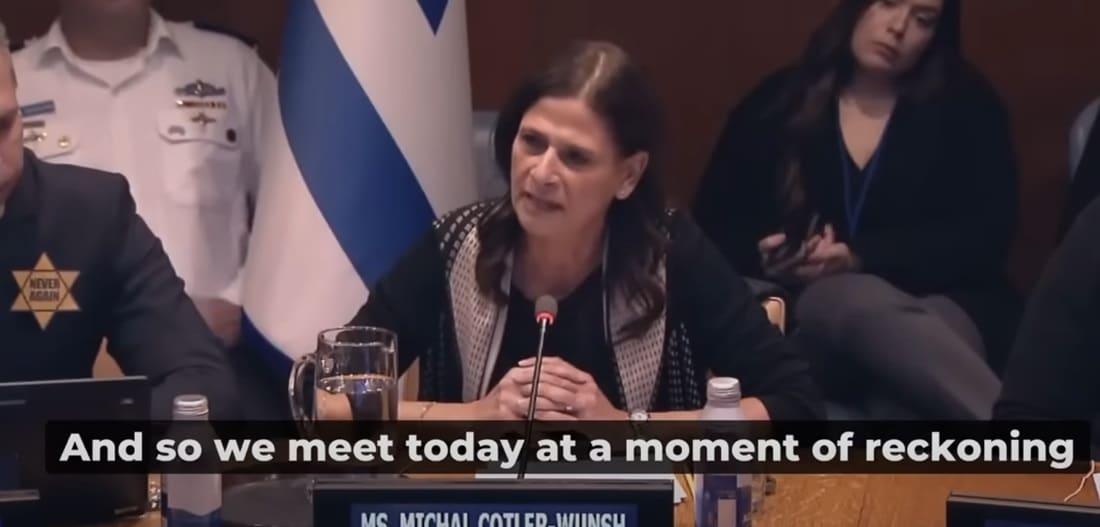The UN Speech by Michal Cotler-Wunsh
Michal Cotler-Wunsh, the Special Envoy for Combatting Antisemitism, recently addressed the United Nations in a stirring speech that highlighted the persistent and evolving threat of antisemitism. Her words were a poignant reminder of the historical roots of this deep-seated prejudice and its dangerous manifestations in the modern world.
Antisemitism and Attacks Against Jews
Jewish individuals have recently faced an alarming increase in attacks across the globe. This surge in violence has been noted in various regions, including the United States and Europe, following the events of October 7th involving Hamas and Israel. These attacks underscore the ongoing challenges faced by the Jewish community, highlighting the importance of Israel’s defensive actions in Gaza.
This recent wave of aggression seems to extend beyond the territorial dispute with Israel, indicating a broader conflict directed against Jewish people. This is evident in instances where Jewish citizens have been inadequately protected by their Western governments, leaving Israel as a key refuge.
The violence includes troubling incidents in places like Dagestan, Russia, and other regions of the North Caucasus. Germany, too, has witnessed a rise in anti-Semitic acts, with a Berlin synagogue being attacked with incendiary devices on October 18th. Despite official condemnations, these events call for more decisive action.
Jewish Schools Under Attack
In the United Kingdom, the escalating threats have led to the temporary shutdown of two Jewish schools in London, reflecting the heightened sense of insecurity among Jewish communities. This sentiment is mirrored in Australia, where a Sydney crowd engaged in hateful rhetoric following the Hamas attack.
The United States has seen a disturbing rise in anti-Semitic incidents, with a 388% increase reported by the Anti-Defamation League between October 7th and 23rd compared to the previous year. These incidents include physical attacks and expressions of support for Hamas during demonstrations against Israel.
This trend blurs the line between anti-Zionism and anti-Semitism, making it hard to justify attacks on synagogues, schools, and other targets as mere political dissent. It raises questions about the consistency of Western leaders in addressing these threats, especially when they call for a ceasefire in Gaza without ensuring the safety of Jewish citizens in their own nations.
Such developments reveal a worrying trend of ignorance and indifference towards anti-Semitic violence. This is particularly concerning when some Western intellectuals and politicians downplay the gravity of these attacks, mislabeling them as anti-colonial resistance.
Protecting Jewish Communities
In the context of this global challenge, it is imperative for Western societies to reaffirm their commitment to protecting Jewish communities. History has repeatedly shown that neglecting the safety of Jewish citizens can have far-reaching consequences, undermining the principles of democracy and human rights.
Antisemitism, a deep-rooted prejudice against Jews, dates back over two millennia. Its origins can be traced to Ancient Greece and Rome, where Jews were marginalized for their distinct religious beliefs and practices. The Middle Ages saw Jews scapegoated for various societal issues, leading to persecution and expulsion across Europe. This period also witnessed the Spanish Inquisition’s targeting of Jews and the establishment of segregated ghettos.
The Holocaust remains the most horrific manifestation of antisemitism, with Nazi Germany’s systematic extermination of approximately six million Jews during World War II. Sadly, antisemitism persisted post-Holocaust, with Jews facing discrimination and hostility in different parts of the world, including state-sponsored antisemitism in the Soviet Union and rising tensions in the Arab world linked to the Israeli-Palestinian conflict.
Today, antisemitism continues in various forms, ranging from physical violence to online harassment and the propagation of harmful stereotypes and conspiracy theories. Often, antisemitism is disguised as criticism of Israel, leading to unfair collective blame on Jews for the actions of the Israeli government. It also finds a foothold in extreme political ideologies, both on the right and the left.
Antisemitism’s long and tragic history continues to impact Jewish communities worldwide. Addressing this issue demands a comprehensive understanding of its various manifestations and a commitment to actively combating its detrimental effects on individuals and societies.

